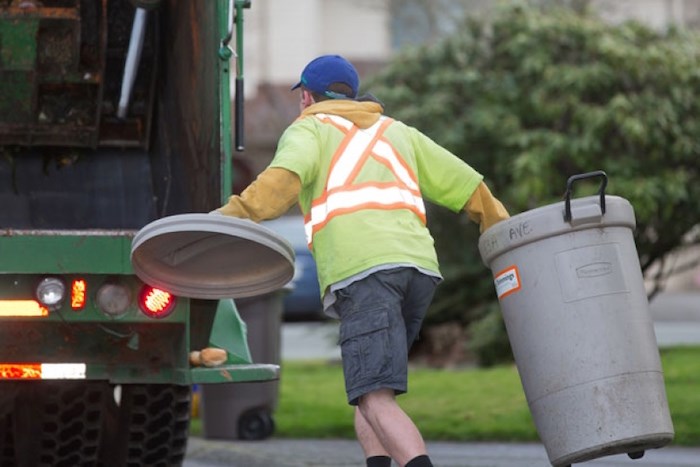The City of Delta is the region’s biggest producer of garbage.
That’s according to a new report by Vancity, State of Waste: How B.C. compares in the war on trash, which found Delta is the top producer of waste from single-family residences that is neither recycled nor composted.
 Garbage collection (Delta Optimist file photo)
Garbage collection (Delta Optimist file photo)
Richmond, Surrey and West Vancouver did not provide data for the study.
Noting that Delta produced 465 kilograms of waste per single-family residence in 2017, compared to the City of Vancouver, which was the next highest at 426 kilograms, the study found, among other things, that in the region spoiled and uneaten food represents about 25 per cent of all residential garbage, more than any other type of waste.
To reduce the amounts of waste, the report has a series of recommendations, including individuals and households accepting the zero waste challenge and tracking the amount of waste they produce. Governments at all levels should standardize and make public all current waste collection, diversion and disposal data, while companies and organizations should establish mandatory waste reduction and paper-free programs in the workplace.
The study also notes that more waste is being diverted to recycling and composting facilities, while new programs have been implemented to promote, and even enforce, waste diversion, and that industries, businesses and individuals are clearly heeding the message and are doing more to eliminate landfill waste.
However, few, if any, communities appear on pace to reach a commonly-shared 80 per cent diversion target set for the year 2020, according to the report.
“Diversion is always preferred to disposal, but it has not solved the waste production problem. Indeed, concerns are often raised that an emphasis on diversion – rather than avoidance – can lead to complacency, creating the ‘illusion’ that as long as waste does not go into a landfill, it is somehow acceptable. And diversion does not come without significant effort and cost. Every empty soda can, pizza box and orange peel must be collected, transported, stored and eventually re-purposed. Each step in the diversion process consumes resources, energy and money that could be spent on other things,” the study explains.
The study adds that one obvious solution is to stop making waste, putting emphasis on waste avoidance.
The City of Delta notes its solid waste and recycling programs are guided by Metro Vancouver's Integrated Solid Waste and Resource Management Plan to encourage waste diversion and waste reduction.
Currently, Delta is one of three municipalities in the region that continues to provide weekly garbage collection. Through the efforts of the city’s Green Can program and overall education, the mandated diversion target for single-family homes has been achieved, according to a city report. At the conclusion of the previous garbage/recycling contract in January 2018, the city was to consider transitioning to bi-weekly garbage collection in an effort to further increase diversion rates.
However, Delta, which also has a popular Spring Clean-Up among its program, for now is sticking with weekly garbage collection.



